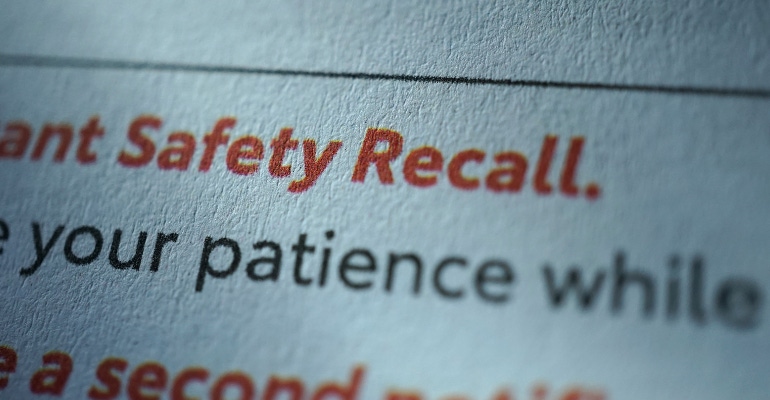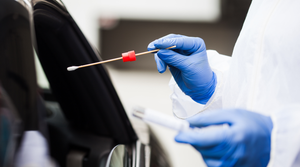Abiomed’s Impella System Hit with Another Recall
The second recall in as many months, the company gets Class I label over potential Impella contact with TAVR implants.

Johnson & Johnson’s Abiomed division is once again the subject of a Class I recall for its Impella heart pumps, this time pertaining to a potential safety conflict in patients with transcatheter aortic valve replacements (TAVR). Initially sent out as a Field Safety Notification to the European Market, this is the first communication on the issue that’s been sent out to the United States market other than a previously published product update in 2017.
“At Abiomed, our first priority is our patients, including the safe and effective use of our products,” the company wrote in a statement to MD+DI. “On June 14, we issued a notification to customers regarding the safe use of left sided Impella heart pumps in patients with a [TAVR] valve. The notification addresses the potential risk for unintentional interaction of the Impella motor housing with the distal stent of a previously implanted TAVR valve and provides further recommendations on how to position Impella in these patients.”
The company’s Impella devices thread into the heart’s chambers via a catheter where an impeller spins to help pump blood after a patient suffers a heart attack, post-coronary bypass surgery, or when the heart isn’t function well due to cardiomyopathy. The impeller helps relieve some of the strain on damaged or recovering cardiac muscle.
For patients who also have a TAVR implant, Abiomed reported that the stentlike struts along the outer edges of the device have a risk of connecting with Impella’s spinning impeller, which can shear the blades and cause parts of the pump to fracture. This collision may result in a dangerous loss of blood flow through the damaged Impella device and spread debris into the bloodstream.
In the recall notice, the company identified 27 complaints (0.7% of patients) where the two devices connected and caused the pump to fracture from 2016 to present day. Of note, 25 of the 27 complaints involved the Impella CP. The notice not only pertains to Impella CP, but also Impella 2.5, Impella LD, Impella 5.0, Impella 5.5 with Smart Assist, and Impella CP with Smart Assist – totaling more than 9,200 distributed devices.
Abiomed also highlighted that the risk of device interaction increases for oversized or under expanded framed with the distal ends not flush with the wall of the aorta, allowing contact of the end of the stent with the spinning impeller. It is recommended that surgeons avoid repositioning the Impella device while it is spinning, and the company is urging healthcare professionals to factor the risk vs benefit profile when a patient with TAVR needs hemodynamic support and positioning the Impella system carefully. Additionally, if low flows are observed while treating a patient with a TAVR implant, it is advised to replace the pump as soon as possible.
Currently, the Impella device is not being removed from hospitals and doesn’t need to be returned to the manufacturer, and Abiomed is updating the device instructions.
“This notification was not a device removal,” Abiomed wrote in an email to MD+DI. “These devices remain available, and Impella technology can continue to be used safely in patients with a previously implanted TAVR valve.”
This Class I recall comes only months after Abiomed was hit with a different recall of some of its Impella 5.5 with Smart Assist systems after receiving complaints of purge fluid leaking from the purge sidearm of the pump. The company reported that, after investigating the complaints, it found damage to the purge sidearm and interaction of sodium bicarbonate with the luer locking mechanism on the purge sidearm that connects to the purge cassette.
“The integrity of the purge sidearm is critical to the delivery of the purge fluid that prevents blood ingress in the pump motor,” according to Abiomed’s Urgent Medical Device Recall Letter, which initially notified customers in April. “After introducing accessories and communications relaying best practices to mitigate these issues, the complaint rate for purge leak due to sidearm damage has decreased but continues to be higher than devices with the preinstalled retainer and new yellow luer. Currently, product in the field includes units with and without the preinstalled retainer and with or without the new yellow luer components.”
Both recalls occurred half a year or so after Johnson & Johnson acquired the company in December 2022 for $16.6 billion, making it one of the largest medtech deals of the year. When the acquisition was announced in November, Abiomed reported a monopoly in mechanical circulatory support, an extensive pipeline, and an 18-year track record of profitable growth.
At the time, Marie Thibault, a BTIG analysist, noted that Johnson & Johnson’s management team had an “unflaggable commitment to growing a new therapy area," making Impella an ideal device platform for it to scale further.
Abiomed acquired Impella in 2005.
About the Author(s)
You May Also Like




